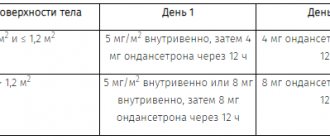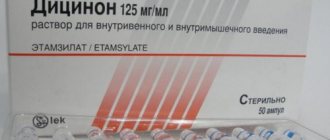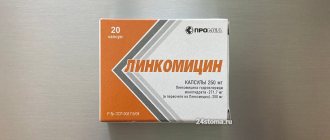Mexidol® (Mexidolum®)
Mexidol® is an inhibitor of free radical processes, a membrane protector with antihypoxic, stress-protective, nootropic, anticonvulsant and anxiolytic effects. The drug increases the body's resistance to the effects of various damaging factors (shock, hypoxia and ischemia, cerebrovascular accidents, intoxication with alcohol and antipsychotics (neuroleptics)).
The mechanism of action of Mexidol® is due to its antioxidant, antihypoxic and membrane protective effects. It inhibits lipid peroxidation, increases the activity of superoxide dismutase, increases the lipid-protein ratio, reduces membrane viscosity, and increases its fluidity. Mexidol® modulates the activity of membrane-bound enzymes (calcium-independent phosphodiesterase, adenylate cyclase, acetylcholinesterase),
Receptor complexes (benzodiazepine, GABA, acetylcholine), which enhances their ability to bind to ligands, helps preserve the structural and functional organization of biomembranes, transport of neurotransmitters and improve synaptic transmission. Mexidol® increases the content of dopamine in the brain. Causes an increase in compensatory activation of aerobic glycolysis and a decrease in the degree of inhibition in oxidative processes in the Krebs cycle. Under hypoxic conditions, with an increase in the content of ATP and creatine phosphate, activation of the energy-synthesizing functions of mitochondria, stabilization of cell membranes.
The drug improves metabolism and blood supply to the brain, improves microcirculation and rheological properties of blood, and reduces platelet aggregation. Stabilizes the membrane structures of blood cells; (erythrocytes and platelets) with hemolysis. It has a lipid-lowering effect, reduces the content of total cholesterol and low-density lipoproteins.
The anti-stress effect is manifested in the normalization of post-stress behavior, somatovegetative disorders, restoration of sleep-wake cycles, impaired learning and memory processes, reduction of dystrophic and morphological changes in various structures of the brain.
Mexidol® has a pronounced antitoxic effect in withdrawal symptoms. It eliminates the neurological and neurotoxic manifestations of acute alcohol intoxication, restores behavioral disorders, autonomic functions, and is also able to relieve cognitive impairment caused by long-term use of ethanol and its withdrawal. Under the influence of Mexidol®, the effect of tranquilizing, neuroleptic, antidepressant, hypnotics and anticonvulsants is enhanced, which makes it possible to reduce their doses and reduce side effects. Mexidol® improves the functional state of ischemic myocardium. In conditions of coronary insufficiency, it increases collateral blood supply to the ischemic myocardium, helps maintain the integrity of cardiomyocytes and maintain their functional activity. Effectively restores myocardial contractility in reversible cardiac dysfunction.
Mexidol: side effects
The medication is well tolerated; non-standard reactions occur in exceptional cases. When using the solution, the following may occur:
- nausea;
- dryness of the oral mucosa;
- constant drowsiness;
- clinical manifestations of allergies, with rashes, itching, redness.
When using tablets, the following is observed:
- discomfort in the epigastric region;
- pain in the abdominal area;
- attacks of nausea, heartburn;
- flatulence;
- loss of appetite, lethargy;
- general weakness, allergies.
In some cases, blood pressure increases or decreases, and coordination of movements is impaired. Patients complain of excessive sweating, problems falling asleep, and emotional reactivity.
Contraindications and side effects
In some cases, taking the drug is excluded:
- chronic kidney disease;
- liver dysfunction;
- individual intolerance to the active or auxiliary component;
- children under 15 years of age inclusive;
- pregnancy period (any stages);
- breastfeeding period.
The use of Mexidol can lead to some side effects:
- nausea, vomiting;
- itching;
- sleep disorders;
- increased fatigue;
- diarrhea;
- depression;
- high blood pressure;
- anxiety;
- migraine.
In these cases, the pills or injections should be stopped immediately. It is necessary to seek the advice of a specialist - perhaps the doctor will decide to replace the drug.
How to take Mexidol?
Mexidol in tablet form is taken orally. The tablet is not chewed or divided in half. You should drink it with plenty of water. Eating does not have any effect on the activity of the medication, so you can take Mexidol before, during or after meals.
The injection form is used for intramuscular injections or intravenous infusions (stream or drip). Before giving the injection, the drug is diluted in a 0.9% sodium chloride solution. It is injected slowly in a stream over 5 - 7 minutes, drip - at a rate of 40 - 60 drops per minute. The maximum daily dose for tablets is 800 mg, for injections - 1200 mg. Course therapy is canceled gradually, after achieving a stable clinical and laboratory effect.
Mexidol solution for intravenous administration
Please note that drowsiness may occur after taking Mexidol, so you should be careful while driving, as well as when engaging in other potentially dangerous activities.
| Disease | Course duration | Dosage* |
| Acute cerebrovascular accident (ACVA) | Initially within 10-14 days | 200-500 mg (i.v. drip) 2 to 4 times/day, then for another 14 days 200-250 mg (i.m.) several times/day |
| Encephalopathy | Initially within 2 weeks | See ONMK |
| Mild cognitive impairment | Course from 2 weeks to a month | 100-300 mg/day (i.m.) |
| Withdrawal syndrome | 5 to 7 days | 200-250 mg/day (iv drip or intramuscular injection) 2 - 3 times/day |
| Antipsychotic drug poisoning | Course in 7-14 days | From 200 to 500 mg/day (iv) |
| Acute edematous (interstitial) pancreatitis | 200-500 mg (iv drip and intramuscular injection) 3 times a day | |
| Necrotizing pancreatitis (mild) | 100-300 mg/day (iv drip and intramuscular injection 3 times/day | |
| Necrotizing pancreatitis (moderate) | 200 mg (iv) 3 times/day | |
| Necrotizing pancreatitis (severe) | In a pulse dosage of 800 mg on the first day, with a double dose regimen. Then 200 - 500 mg 2 times a day with a gradual reduction in the daily dose. | |
| Necrotizing pancreatitis (extremely severe) | From 800 mg/day to relieve shock. Next, 300 - 500 mg (iv drip) 2 times a day with a gradual reduction in the daily dosage. | |
| Open-angle glaucoma of various stages | Course 14 days | IM 100 - 300 mg/day, 1 - 3 times/day |
| Traumatic brain injury and consequences of traumatic brain injury | Within 10 -15 days | IV drip 200 - 500 mg 2 - 4 times / day |
*When taking pills. The method of administering the Mexidol injection in the same dosage is indicated in parentheses.
The duration of therapy for patients with coronary heart disease is at least 1.5-2 months. It is advisable to carry out repeated courses (on the recommendation of a doctor) in the spring and autumn.
In case of acute myocardial infarction, as part of complex therapy, it is administered intravenously (the first 5 days) and intramuscularly (the next 9 days) for 14 days against the background of traditional therapy for myocardial infarction, including nitrates, beta-blockers, angiotensin-converting enzyme (ACE) inhibitors, thrombolytics, anticoagulants and antiplatelet agents, as well as symptomatic agents according to indications.
Indications
In neurology, Mexidol is used in the following cases:
- acute cerebral circulatory disorders and discirculatory encephalopathy (otherwise – cerebral atherosclerosis);
- after transient ischemic attacks, in the subcompensation phase as preventive courses;
- vegetative-vascular dystonia;
- cognitive problems of atherosclerotic origin (impaired speech, memory, attention, intelligence and other symptoms associated with the development of atherosclerosis).
In psychiatry Mexidol is prescribed:
- to relieve withdrawal symptoms (otherwise known as withdrawal) due to alcohol and drug addiction;
- in case of intoxication with neuroleptics (drugs intended for the treatment of psychosis);
- to alleviate the impact of extreme (stress) factors;
- for anxiety disorders and neurotic and neurosis-like conditions.
Mexidol is also used for acute purulent-inflammatory processes of the peritoneum (necrotizing pancreatitis and peritonitis) as part of a complex of therapeutic treatments.
Analogs
The pharmaceutical market offers not only Mexidol, but also its analogues. The drugs differ in the main substance (although the synonyms of Mexidol still contain the same ethylmethylhydroxypyridine succinate), auxiliary components, manufacturers, and the quality of purification of the raw materials used. That is why, after consulting a doctor, you can select medications in pharmacies that are similar in their therapeutic effect to Mexidol tablets, but are suitable for a specific clinical picture.
Replacement of the drug with an analogue must be agreed with the attending physician
Mexidol analogue tablets include:
- Medomexy;
- Mexiprim;
- Mexidant;
- Mexipridol;
- Mexicofin;
- Neurox;
- Cerecard.
Analogues of Mexidol injections
In terms of therapeutic effect, the following drugs are similar to the solution:
- Medomexy;
- Armadin;
- Mexico;
- Astrox;
- Mexipridol;
- Mexiprim.
The therapeutic effect can be achieved by other active substances. But not always analogues in effect can ideally replace the drug chosen by the doctor, so replacement is possible only after consultation.
Thus, the following medications are considered analogous in effect:
- Kaviton (active ingredient - vinpocetine) improves metabolism in brain cells, helps improve blood circulation;
- Nootropil (active ingredient - piracetam) stimulates brain activity;
- Glycine (active ingredient - glycine) improves processes in the brain;
- Cytoflavin (active ingredient - succinic acid) stimulates brain activity, improves thought processes, etc.
Mexidol or Actovegin?
Often those who take Mexidol are faced with a choice between it and Actovegin. What's better? The drugs have similar uses and are often prescribed together. Both act on the central nervous system, eliminate hypoxia, restore metabolism and affect the circulatory system. But Mexidol has broader pharmacological properties, and it is used in most cases. Allergic reactions to Actovegin are more common, but it can be taken by pregnant women. Also, unlike Mexidol, Actovegin is used for disorders in peripheral vessels, and to treat the consequences of such disorders - trophic ulcers and angiopathy. As a result, the decision to prefer one of the drugs or take them together falls on the shoulders of the doctor.
Interaction with other medications
Mexidol has demonstrated itself as a medicine that has a high degree of compatibility with other drugs, including those used for the treatment of pathological phenomena in the field of neurology.
However, it is worth immediately noting that Mexidol can enhance the effect of drugs such as benzodiazepines, carbamazepine and drugs for the treatment of Parkinson's disease, hypnotics and anti-seizure drugs. This makes it possible to reduce their dosage and eliminate most signs of the clinical picture.
Mexidol reduces the toxicity and harmfulness of ethyl alcohol. This is a rather useful feature that is used when carrying out therapeutic measures against the physical and mental disorders of alcohol syndrome.
Mexidol during pregnancy and lactation
Often, medications for pregnant women and nursing mothers are prescribed with caution, and also in cases where the benefits to the mother outweigh the risks to the fetus and newborn. It’s the same story with Mexidol. There are no statistically reliable studies of the use of the drug in pregnant women, nursing mothers and children. That is, there are no clinical studies on which to rely, alas. Therefore, the drug is either prescribed as a last resort or is not recommended for use.
Mexidol is prescribed with caution during pregnancy
As for children, the use of Mexidol in pediatrics is indicated in the treatment of purulent neuroinfections, traumatic brain injuries, as well as for emergency care in case of childhood traumatic brain injuries (100 mg once).


